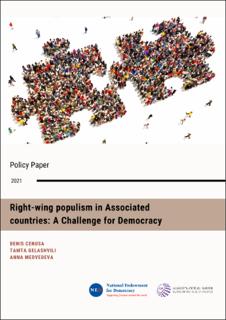| dc.contributor.author | Cenusa, Denis | |
| dc.contributor.author | Gelashvili, Tamta | |
| dc.contributor.author | Medvedeva, Anna | |
| dc.date.accessioned | 2022-07-27T07:27:43Z | |
| dc.date.available | 2022-07-27T07:27:43Z | |
| dc.date.created | 2021-08-16T08:31:39Z | |
| dc.date.issued | 2021 | |
| dc.identifier.uri | https://hdl.handle.net/11250/3008753 | |
| dc.description.abstract | This policy paper provides a structured comparative analysis of the nationalist populist actors, discourses and strategies in three Associated [1] Eastern Partnership (EaP) countries – Ukraine, Moldova and Georgia. It assesses the challenges of the radical right, nationalist populist groups on democratic developments in the Associated EaP countries: - the role of external actors, the tactics and policies used and how to deal with and manage this threat. The study was prepared by a group of Ukrainian, Moldovan and Georgian authors with specializations in national populism and its impact on political processes in these three countries. Research methodology includes desk research, as well as qualitative interviews, organized in each country with the involvement of local experts, journalists and civil society activists. The policy paper provides recommendations on how to mitigate the negative effects of anti-democratic, national populist groups and how to strengthen resilience against national populism in these EaP countries. This policy paper provides a number of significant findings which may be relevant for various state and nonstate stakeholders and beneficiaries who work on democratization and Europeanization issues in and around these three countries. Firstly, the paper highlights significant regional differences and similarities among them and explores their complex socio-political context, which is in many ways different from that of EU countries. Understanding the regional context is important to key national and international stakeholders in order to prioritize proper policy responses to populist challenges and select the most suitable programs and practices to neutralize populist nationalist challenges. As one of its key conclusions, the policy paper highlights a very diverse picture of nationalist populism challenges in these countries which is a relevant finding for the EU: to switch from its traditional one-size-fits-all approach to one that uses a country-by country-based differentiation when supporting these countries in their fight against national populism. | |
| dc.language.iso | eng | en_US |
| dc.publisher | Georgian Institute of Politics | en_US |
| dc.relation.ispartof | GIP Policy Paper | |
| dc.relation.ispartofseries | GIP Policy Paper;24 | |
| dc.relation.uri | http://gip.ge/right-wing-populism-in-associated-countries-a-challenge-for-democracy/ | |
| dc.subject | Russland og Eurasia | |
| dc.subject | Russia and Eurasia | |
| dc.subject | Nasjonalisme | |
| dc.subject | Nationalism | |
| dc.subject | Terrorisme og ekstremisme | |
| dc.subject | Terrorism and extremism | |
| dc.title | Right-wing Populism in Associated Countries: A Challenge for Democracy | en_US |
| dc.type | Research report | en_US |
| dc.description.version | publishedVersion | |
| dc.subject.nsi | VDP::Internasjonal politikk: 243 | |
| dc.subject.nsi | VDP::International politics: 243 | |
| dc.source.pagenumber | 41 | en_US |
| dc.source.volume | 2021 | en_US |
| dc.source.issue | 24 | en_US |
| dc.identifier.cristin | 1926145 | |
| cristin.ispublished | true | |
| cristin.fulltext | original | |
